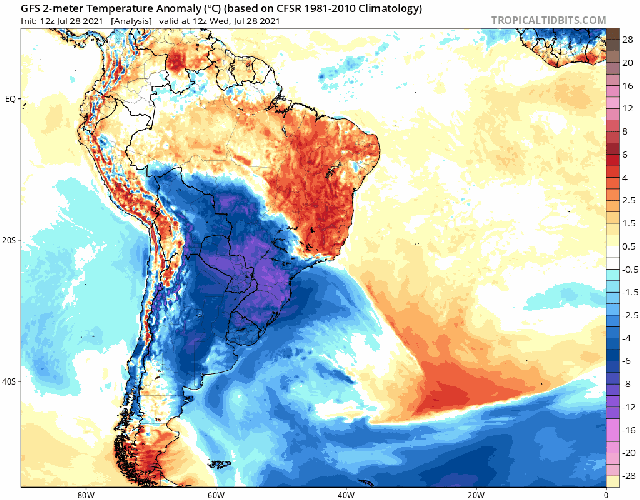South America has been buffeted by extreme polar chills in recent months.
Historic snowfall hit Argentina in mid-June, while a host of new all-time low temperature records have been set across the South American continent throughout July–including the second coldest temperature ever logged in the tropics.
A new wicked freeze tore through southern Brazil this week, further damaging the nation’s coffee and corn crops–among others.
Rare and heavy snowfall also swept the country –on Wednesday (July 28)– leaving at least 13 cities across the state of Rio Grande do Sul blanketed in snow — an unprecedented feat.
Meteorologists began warning of this latest round of polar cold last week, saying it was set to be the coldest since 1955.
“The cold air mass has the potential to be one of the most intense of this century,” warned MetSul.
The weather agency saw a large mass of Antarctic air threatening to ride unusually-far north on the back of a weak and wavy ‘meridional’ jet stream flow (a phenomenon associated with the historically low solar activity Earth is currently receiving).
As result of the warning, health authorities met on Monday to prepare for the polar outbreak.
This was just in time, as on Tuesday the cold wave hit, and soon engulfed the majority of the South American continent:
GFS 2m Temperature Anomalies (C) July 28 – 31 [tropicaltidbits.com].
This extreme cold is forecast to persist throughout the weekend, with readings some 20C below the seasonal norms expected.
Such exceptional lows will further ravage the continent’s already decimated coffee and corn harvests, particularly in Brazil; but Uruguay, Paraguay, Bolivia, and Argentina are also suffering substantial losses.
This will result in serious ramifications on already skyrocketing global food indexes.
The mercury reached an all-time low -7.8C (18F) in the state of Santa Catarina on Wednesday.
While rare snowfall has been reported in at least 13 cities across the state of Rio Grande do Sul.
According to MetSul’s website, a record 33+ municipalities in Rio Grande do Sul saw snow on Wednesday.
Brazilians took to the streets to “celebrate” the arrival of the global warming goodness.
They shared photos and footage of the historic event on social media:
(screen shot only CC)
“In more than 30 years of weather forecasting in Rio Grande do Sul, we have never seen horizontal snow with such strong winds and greatly reduced visibility. It’s what North Americans call a snowstorm,” said MetSul.
(Screen shot CC)
(screen shot CC)
(screen shot CC)
The MSM may be obsessed with their heat-driving agenda, but they’re exclusions of ‘negative’ anomalies are telling.
As is their sidestepping of the inconvenient fact that Earth’s average temperature is currently holding below the 30-year average:
The AGW theory is collapsing like a flan in cupboard.
And if a crippling bout of global cooling wasn’t on the horizon, the collapse would be comical (saying that, watching the likes of Michael Mann and Gavin Schmidt see their years of fear-mongering and data-tampering exposed will still bring a smile to my face).
The COLD TIMES are returning, the mid-latitudes are REFREEZING, in line with the great conjunction, historically low solar activity, cloud-nucleating Cosmic Rays, and a meridional jet stream flow (among other forcings).
Both NOAA and NASA appear to agree, if you read between the lines, with NOAA saying we’re entering a ‘full-blown’ Grand Solar Minimum in the late-2020s, and NASA seeing this upcoming solar cycle (25) as “the weakest of the past 200 years”, with the agency correlating previous solar shutdowns to prolonged periods of global cooling here.
Furthermore, we can’t ignore the slew of new scientific papers stating the immense impact The Beaufort Gyre could have on the Gulf Stream, and therefore the climate overall.
Recommend this post and follow
The Life of Earth








No comments:
Post a Comment
Stick to the subject, NO religion, or Party politics